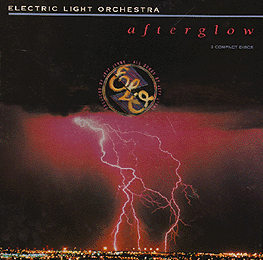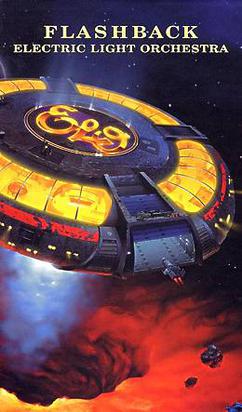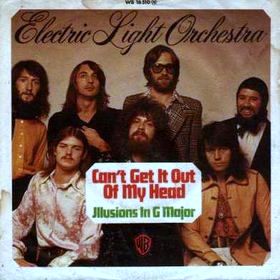
The Electric Light Orchestra (ELO) are an English rock band formed in Birmingham in 1970 by songwriters and multi-instrumentalists Jeff Lynne and Roy Wood with drummer Bev Bevan. Their music is characterised by a fusion of pop and classical arrangements with futuristic iconography. After Wood's departure in 1972, Lynne became the band's sole leader, arranging and producing every album while writing nearly all of their original material. For their initial tenure, Lynne, Bevan, and keyboardist Richard Tandy were the group's only consistent members.

Face the Music is the fifth studio album by Electric Light Orchestra (ELO). It was released in September 1975 by United Artists Records and on 14 November 1975 in the United Kingdom by Jet Records. The album moves away from the large-scale classical orchestrated sound from the previous album, Eldorado, in favour of more "radio-friendly" pop/rock songs, though the string sections are still very prominent. The new sound proved successful for the group as Face the Music was the first ELO album to go platinum.

On the Third Day is the third studio album by Electric Light Orchestra (ELO), and the first to be recorded without input from Roy Wood. It was released in the United States in November 1973 by United Artists Records, and in the United Kingdom on 14 December 1973 by Warner Bros. Records. From this album on, the word The was dropped from the band's name. The album was reissued on 12 September 2006.

ELO 2 is the second studio album by the Electric Light Orchestra (ELO), released in 1973. In the US, the album was released as Electric Light Orchestra II. It was the band's last album to be released by the Harvest label, the last on which the band used the definite article The in their name, and the one that introduced their abbreviated name 'ELO'.

A New World Record is the sixth studio album by Electric Light Orchestra (ELO). It was released in October 1976 on United Artists Records in the U.S., and on 19 November 1976 on Jet Records in the United Kingdom. A New World Record marked ELO's shift towards shorter pop songs, a trend which would continue across their career.

Out of the Blue is the seventh studio album by the British rock group Electric Light Orchestra (ELO), released on 28 October 1977. Written and produced by ELO frontman Jeff Lynne, the double album is among the most commercially successful records in the group's history, selling about 10 million copies worldwide by 2007.

Secret Messages is the tenth studio album by Electric Light Orchestra (ELO), released in 1983 on Jet Records. It was the last ELO album with bass guitarist Kelly Groucutt, conductor Louis Clark and a full orchestra, and the last ELO album to be released on the Jet label. It was also the final ELO studio album to become a worldwide top 40 hit upon release.

ELO's Greatest Hits is a compilation by the Electric Light Orchestra (ELO), released in 1979. Despite being released after the album Discovery, this album omitted the band's most recent hits, "Don't Bring Me Down" and "Shine a Little Love".

Afterglow is the third box set compilation by Electric Light Orchestra (ELO). It was released in 1990 with liner notes by music critic and editor Ira Robbins of Trouser Press. A different two-CD compilation with identical artwork was issued simultaneously under the title The Very Best of The Electric Light Orchestra.

Flashback is the second box set compilation by Electric Light Orchestra (ELO), released in November 2000 in the US and the following month in the UK.

All Over the World: The Very Best of Electric Light Orchestra is a compilation album by the Electric Light Orchestra, released in 2005.

Strange Magic: The Best of Electric Light Orchestra is a compilation album by Electric Light Orchestra (ELO), released in 1995 only in the US.

"Can't Get It Out of My Head" is a song written by Jeff Lynne and originally recorded by Electric Light Orchestra.

"Do Ya" is a song written by Jeff Lynne, that was originally recorded by The Move, which became a hit for the Electric Light Orchestra in 1977.

"Showdown" is a 1973 song written by Jeff Lynne and recorded by the Electric Light Orchestra (ELO). It was the band's last contemporary recording to be released on the Harvest label. It was released as a single and reached No 12 in the UK Singles Chart, in the week beginning 28 October, and No 9 on the Norwegian chart VG-lista.

"Evil Woman" is a song written by lead vocalist Jeff Lynne and recorded by Electric Light Orchestra (ELO). It was first released on the band's fifth album, 1975's Face the Music.

"Telephone Line" is a song by English rock band Electric Light Orchestra (ELO). It was released in May 1977 through Jet Records and United Artists Records as part of the album A New World Record. It was very successful, reaching the Top 10 in Australia, US, and UK, and number 1 in Canada.

"Don't Bring Me Down" is the ninth and final track on the English rock band the Electric Light Orchestra's 1979 album Discovery. It is their highest-charting hit in the United States to date.

"Shine a Little Love" is a song by the English rock band Electric Light Orchestra (ELO). It was released as a single in the US and UK in 1979.

"Boy Blue" is a song written by Jeff Lynne and performed by the Electric Light Orchestra (ELO) which first appeared as track number 3 from their 1974 album Eldorado.




















